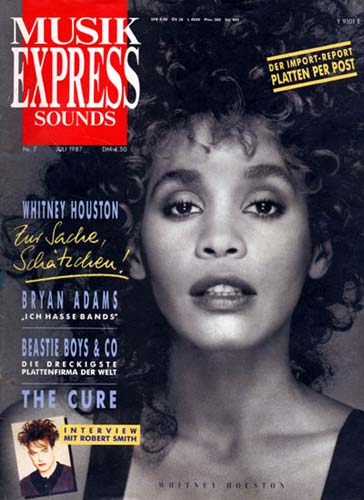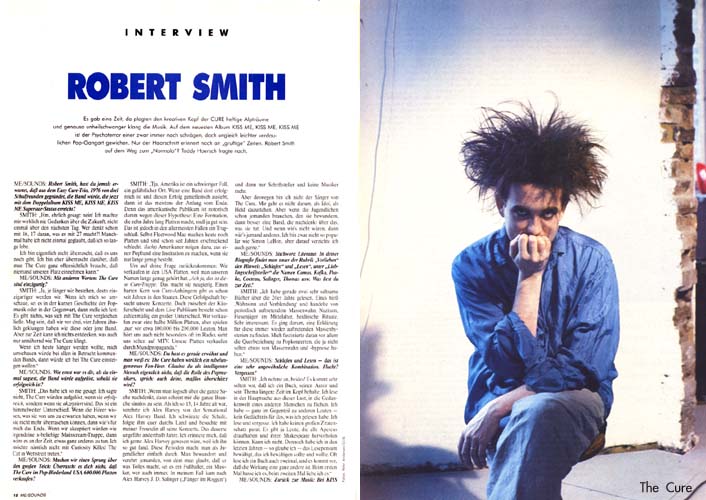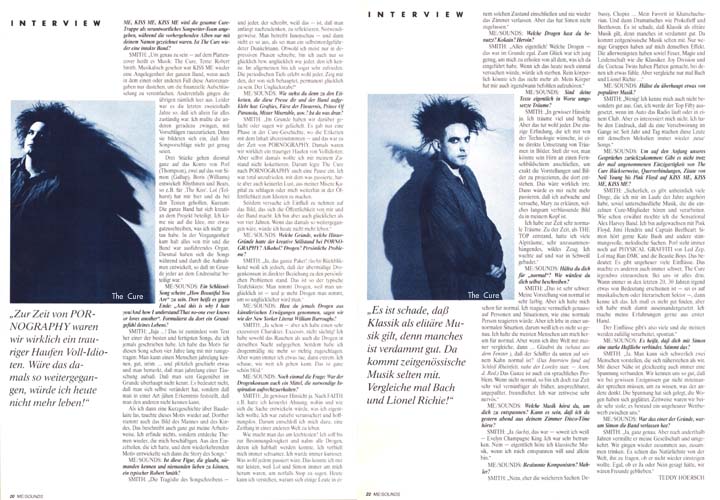"Interview - Robert Smith"



July
1987
- M/E Sounds
(Germany)*
(Translation below)
"Interview - Robert Smith"



Interview - Robert Smith
There was a time when the creative head of The Cure was plagued by severe nightmares and thatís exactly as ominuous as the music sounded. On the latest album KISS ME, KISS ME, KISS ME the psychoterror gave way to a still wicked but unequally easier digestible pop pace. Only the hair cut still reminds of ďgothď times. Robert Smith on his way to be a ďnormalď person? Teddy Hoersch reports.
ME/SOUNDS: Robert Smith, did you ever expect that the Easy Cure trio, founded by three school mates in 1976, would turn into the band which has now reached superstar status with the double album KISS ME, KISS ME, KISS ME?
SMITH: Well, to be honest: No! I really never thought about the future, not even about the next day. When youíre 16 or 17 - who would think about what you will do with 27? Sometimes I didnít even think Iíd live that long.
Actually Iím not even surprised that weíre still around. Iím rather surprised that The Cure is so obviously needed, that nobody else can take our place.
ME/SOUNDS: In other words: The Cure is unique?
SMITH: Yeah, the longer we exist the more unique we are. If I take a look around, let it be in pop music or the present time, I realise one thing: There is nothing which can compare to The Cure. It could be that three or four years ago we might have sounded similar to this or that band. But right now I canít see anything which sounds even remotely like The Cure.
If I wanted to be a singer these days, had checked out all possible bands, Iíd want to join The Cure.
ME/SOUNDS: How serious were you when you said that the band would break up the instance it turned successful?
SMITH: I never said it like that. I didnít say ďThe Cure would break up if it turned successfulď but when it was accepted. Thatís a major difference. If the audience knew what they would get, if we couldnít surprise them anymore, that would be the end for me. If we were accepted like any mainstream combo then it would be time to do something totally different. You see, I donít want to be in contest with Curiosity Killed The Cat.
ME/SOUNDS: Letís take a look towards the States. Arenít you surpised that The Cure sold 600.000 records in the pop land USA?
SMITH: Well, the US is a difficult case, a dangerous place. If a band made it over there and then lives their success thatís most of the time the beginning of the end. The American audience is notoriously dumb because of the following thesis: A formation which made records for ten years simply has to be great. But thatís not true in most of the cases. Even Fleetwood Mac are still making records but are already appallingly bad for years. (laughs) Americans tend to institutionalise a pop band if it only exists long enough.
To come back to your question: We sell records in the USA because we were around for long enough. ďOh right, thatís those Cure guys.ď That makes them curious. A devoted core of Cure fans did already exist in the States for years. These people visit our concerts. But there is a great difference between the number of purchasers and the number of concert goers. Even though we do sell half a million records, we ďonlyď play in front of 100.000 to 200.000 people. You also donít hear us often on the radio or on MTV. Our records sell by word-of-mouth advertising.
ME/SOUNDS: You just mentioned it and everybody knows it: The Cure really has a number of die-hard fans. Do you, as an intelligent person, actually not think that the role of a pop musician Ė meaning: also your own Ė is exorbitantly overestimated?
SMITH: If you look at it logically, the music business seems to be meaningless. When I was about 13 or 14 I worshipped Alex Harvey of the Sensational Alex Harvey Band. I played truant, followed him through the entire country and went to all of his concerts with my girlfriend. That lasted about one and a half years. I remember that I wanted to be Alex Harvey because I thought he was so cool. You just go through this phase when youíre a teenager. You admire and worship someone who does something awesome in your eyes, let it be a soccer player, a musician, whatever. In my case Alex Harvey was followed by J. D. Salinger (ďCatcher in the Ryeď) and then only writers and no musicians.
But thatís not the reason why Iím the singer with The Cure. To me it doesnít matter to be an idol, a hero. But when the kids do need someone to look up to then let it rather be a band who think about what they do. And if it wasnít us, then it would be somebody else. Iím not as popular as Simon LeBon but Iím not sad about that.
ME/SOUNDS: Next topic: Literature. In your biography you can find under ďPreferencesď things like ďSleepingď and ďReadingď. Under ďFavourite authorsď you find names like Camus, Kafka, Peake, Cocteau, Salinger, Thomas. What are you reading right now?
SMITH: Iíve just finished two very strange books on the 1920s. One was called ďInsanity And Dazzlementď [not the exact title, just translation; translator] and was about periodically appearing mass hysteria: Nazism, witch hunters in mediaeval times, heathen rituals. Very interesting. It was about finding an explanation for all those recurring themes. Iím fascinated by the cross references to pop concerts which frequently have aspects of mass hysteria and mass hypnosis.
ME/SOUNDS: Sleeping and reading Ė thatís a very weird combination. Escape? Oblivion?
SMITH: I guess both. Itís not often that I can keep in mind a book, the author and the plot for a longer time. The actual reason why Iím reading is because I want to dive into the thoughts of another person. I cannot Ė in contrast to other people Ė keep in mind what I read. I read and forget. I donít have a lot of quotes ready to present. Of course there are people who know their Apercus or can boast with their Shakespeare quotes. But still, within the last couple of years I have Ė thatís what I believe Ė managed to read the amount of reading I should and wanted to. Often, I also read the book twice and it happens that the impact is totally different. On first reading I hate it, on second I love it.
At the time of PORNOGRAPHY we really werenít much more than a sad bunch of complete idiots. If it went on like it did, I wouldnít be alive today.
ME/SOUNDS: Back to the music: On KISS ME, KISS ME, KISS ME all of the Cure members are listed as songwriters but on all of the previous albums there was only your name. Is The Cure an intact band again?
SMITH: To be precise Ė in the credits it says Music: The Cure, Lyrics: Robert Smith. Musically speaking, KISS ME was the business of the whole band even if in some cases those credits are just there to simplify financial breakdowns. Otherwise the others wouldnít get any money at all. Unfortunately it was only me who was responsible for everything during the last two and a half years. I almost had to force the others to come up with suggestions. They thought their suggestions for songs werenít good enough.
Three songs were made by Porl (Thompson), two by Simon (Gallup). Boris (Williams) developed rhythms and beats, for example for ďThe Kissď. Lol (Tolhurst) helped me every now and again with lyrics. To cut it short: The entire band worked creatively on this project. I would never take any credits I donít deserve. In the past everything was my work and the band was just the agency. This time the songs developed during and because of the takes so that actually everybody was a part of the result.
ME/SOUNDS: ďHow Beautiful You Areď seems to be a key song. Towards the end it says: ďAnd this is why I hate you/And how I understand/That no-one ever knows or loves anotherď. Is this one of your basic feelings of your life?
SMITH: Yeah! This is, at least lyrics-wise, one of the best and most accomplished songs I ever wrote. I carried the motif of this song around with me for four years. You can know a person for years, well, intimate...and suddenly something happens and you realise that everything was a fraud. That you donít know the other person at all. This doesnít mean that you yourself changed but that you realise with a sudden cognition that you cannot even know the other one.
And then I read a short story by Baudelaire and this motif reappeared again. Thatís where I took the image of the man and the child. Thatís also a good example of the way I work. I donít make things up but just rediscover motifs which occupy my mind. With these bits and the recurring theme I developed the story of the song.
ME/SOUNDS: Is this
character, who thinks he cannot know or love anyone, a typical Robert Smith?
SMITH: The tragedy of song writing Ė and everybody who writes knows that Ė is
that you start to think, to reflect. Necessarily. You look inside of you Ė and
then it seems as if you are a suicidal goth. Even though I tend to write in
depressive phases Iím just as happy or unhappy as any person I know. Generally
speaking Iím even very content. I guess everybody knows those periodically
downs. Show me the one who pretends to be permanently happy. The jinx.
ME/SOUNDS: What do you think about the labels which the press gave you and your band: Goths, Lord of Darkness, Prince of Paranoia, Mister Miserable, etc? Is there a true core?
SMITH: Basically we laughed about it or letís say we smiled. There was only one era in Cure history when the labels matched the content Ė and that was the era of PORNOGRAPHY. Back then we really werenít much more than a bunch of complete idiots. But even back then I didnít want to show off with my attitude. Thatís why The Cure took a break after PORNOGRAPHY. I was totally unhappy with what was going on, but I also didnít want to make money with how I felt or go on and act like a fool in public.
Since then I tried to influence the public image of me and the band. But Iím also happier than four years ago. If it went on like it did, I wouldnít be alive today.
ME/SOUNDS: What reasons, what background did the creative standstill in PORNOGRAPHY have? Alcohol? Drugs? Personal problems?
SMITH: Yeah, all of it! (laughs) But looking back I know that the excessive consumption of drugs was in direct relation with personal problems. Thatís the typical vicious circle: You take drugs because youíre unhappy Ė and the more drugs you take the more unhappy you get.
ME/SOUNDS: Did you ever
take drugs because of artistic reasons, like for example the New York writer
William Burroughs?
SMITH: Yes, I did Ė but I have a really excessive character. Excessive, not
addicted! I quit smoking as well as drugs within the same night. Since then I
never really took as much drugs. But whenever I do anything, itís going to be
extreme. I try to find my limits. Thatís pretty stupid.
ME/SOUNDS: Back to the question: Was the drug usage also a means to keep up the necessary inspiration?
SMITH: In a way yes. After FAITH, for example, I didnít have a clue about in what direction or how the whole thing would develop, which was what I actually wanted. I was utterly insecure and hopeless. Thatís why I decided to live in a different world for some time.
How do you easily achieve that? I got drunk till I fainted and took every drug I could get. I started to act strange. I became very weird. Which would have happened to everybody. I could only do that because Lol and Simon where always there to stop me if necessary. Today I can understand why some people lock themselves up and never leave the room again. But Simon didnít let me do that.
Itís a pity that classical music is labeled as elitist music because some of it is really good. Contemporary music canít catch up with it. Just compare Bach with Lionel Richie!
ME/SOUNDS: Which drugs did
you take? Cocaine? Heroin?
SMITH: Actually all of it! What kind of drug Ė it didnít matter. Fortunately I
was young enough to recover from all of the stuff I took. If I tried the same
thing today I would die. My body also forced me to give it up at some point.
ME/SOUNDS: Are your lyrics actually dreams put into words?
SMITH: In a way yes. I dream a lot and deep. But I guess thatís normal. The only thing Iíd want from technology is a direct realisation of dreams into images. Just imagine to link your brain with a tv screen to project the exact same pictures which are made in there. That would be really terrific .Then I wouldnít have to wake up and try to explain to Mary what image there is in my head which is slowly fading away.
Right now I have pretty normal dreams. At the time of the making of THE TOP I had a lot of nightmares, very incoherent, strange things. I woke up and was pouring sweat.
ME/SOUNDS: Do you think
youíre ďnormalď? How would you describe yourself?
SMITH: Thatís really difficult. My picture of being ďnormalď is pretty diverse.
But I do think Iím normal. I guess I react to persons and situation the same way
like a normal person would. But I live in an abnormal situation thatís why Iím
not sure. I think most of the people around me are normal. But when I compare
their world with mine...Do you think (looks out of the window) that the
skipper on this boat is normal? (The interview was taken on SchloŖ Rheinfels,
near the Loreley Ė author) All of this is a linguistic problem. If Iím not
normal Iím at least more reasonable than back then, more accessible, more
adapted, friendlier. I was very nervous for some time.
ME/SOUNDS: What kind of
music do you listen to to relax? Is it possible that I heard disco tunes coming
out of your room last night?
SMITH: Yes, (laughs) that was Ė as far as I know Ė Evelyn Champagne
King. I was very drunk. No Ė actually I listen to classical music if I want to
relax and if Iím alone.
ME/SOUNDS: Any particular
composers? Mahler?
SMITH: No, rather softer stuff: Debussy, Chopin...My favourite is
Khatschachurian. And then dramatic music like Prokofieff and Beethoven. Itís a
pity that classical music is labeled as elitist music because some of it is
really good.
ME/SOUNDS: Do you actually like popular music?
SMITH: Only a bit! Iím also not very up-to-date. Right, Iím confronted with the Top Fifty if the radio in the car or in a club is running. But Iím not interested in it. I have the impression that there is a conspiracy going on: For years and years people have been making ďnewď song with the same old tunes.
ME/SOUNDS: To come back to the beginning of our conversation: Arenít there cross references, influences or quotes by people like Neil Young up to Pink Floyd on KISS ME, KISS ME, KISS ME by The Cure Ė despite your assumed uniqueness?
SMITH: Certainly. There are incredibly many things which I listened to over the years, so many different kinds of music which the single Cure members listened to and used. As already mentioned I liked the Sensational Alex Harvey Band. I grew up with Pink Floyd, Jimi Hendrix and Captain Beefheart. Simon listens to Kate Bush and other atmospheric, melodic things. Porl is still into PHYSICAL GRAFFITI by Led Zep. Lol likes Run DMC and the Beastie Boys. That means: There are a whole bunch of influences. Thatís why itís hard for people to label The Cure. Thereís everything in our band. Anything which was of any importance and which came out within the last 20, 30 years Ė let it be musical or literary Ė I know it. I donít have to like it but I know it. I like to make my experiences on my own.
So, there are many influences and most of them were used by chance, spontaneous.
ME/SOUNDS: People say that
you and Simon have a love-hate relationship?
SMITH: Yeah. Itís hard to think of any two persons who are closer than we are.
With this closeness there is always tension. We know each other so well that we
donít even have to talk in certain situations to know what the other one is
thinking. The tensions ceased. From time to time both of us were very proud;
there was a huge contest between us.
ME/SOUNDS: Was that one of
the reasons why Simon left the band?
SMITH: Yes, exactly. But after one and a half years he missed my company and
vice versa. We started to go out again, went drinking. It seemed to be the most
natural thing of the world to ask him whether he didnít want to come back. No
matter whether he had said Yes or No, weíd have stayed friends.
TEDDY HOERSCH
THANKS to: Falland. for the TRANSLATION.